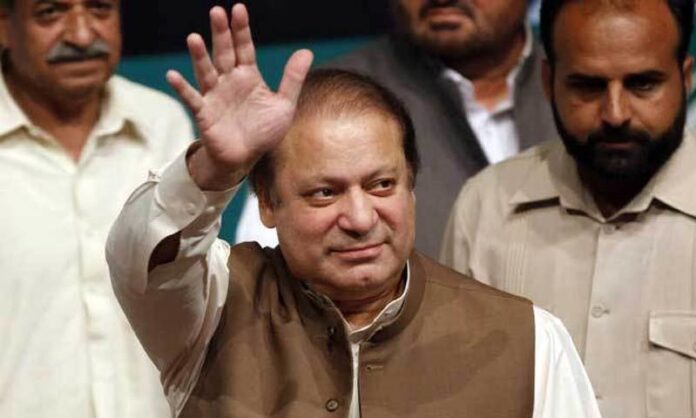In 2000, Nawaz Sharif was released from prison and went into exile in Saudi Arabia after agreeing to leave Pakistan for 10 years in exchange for a shortened imprisonment sentence. In September of that year, Sharif returned to Pakistan to rally the populace behind the overthrow of Musharraf’s administration, following a Supreme Court declaration in 2007 permitting his return. However, in an illegal effort by Musharraf to keep his political rival abroad, Sharif was instructed to return to Saudi Arabia. In late November 2007, Musharraf allowed Sharif, along with his wife and brother, to return to Pakistan on an aircraft provided by King Abdullah. Crowds of supporters greeted Sharif’s arrival, demonstrating his enduring popularity; these celebrations were mostly unobstructed by police. Following his return, Sharif prepared to run in the January elections.
Benazir Bhutto, who had just received permission to return to Pakistan, was tragically killed in Rawalpindi in December 2007 while campaigning. The PML-N came in second place to Bhutto’s party, led by her husband Asif Ali Zardari, in the February 2008 elections, winning nearly one-fourth of the parliamentary seats up for grabs. The two parties established a coalition administration in March. However, disagreements surfaced in the months following the coalition’s establishment. The coalition moved to file impeachment allegations against Musharraf in August 2008, and on August 18, Musharraf resigned in response to the impending hearings.
In September, Zardari was elected as President. Tensions between Zardari and Sharif grew when the Supreme Court decided to remove Sharif’s brother from his role as Punjab’s chief minister and impose a ban barring Sharif from holding political office in February 2009. Sharif criticized these judicial decisions as politically motivated and supported by Zardari. The status of Supreme Court judges dismissed under Musharraf and not reinstated remains a key point of contention between the two adversaries. In March 2009, Sharif evaded an attempt to place him under house arrest to lead a rally in Islamabad advocating for the reinstatement of dismissed judges.
The Supreme Court overturned the February decision restricting Sharif’s political activities in late May, and in July, Sharif was exonerated of all charges related to a hijacking. With the final legal hurdle removed against him, Sharif was able to run for public office. He continued to speak out against Zardari and the Pakistan People’s Party (PPP). Following an impressive political comeback in 2013, Sharif was elected to a third term as prime minister after the PML-N triumphed comfortably in the May legislative elections. However, the victory wasn’t without controversy. Imran Khan’s Tehreek-e-Insaf, the opposition party, declared the elections stolen and staged months-long protests in Islamabad.
Sharif’s efforts to promote better ties with India, stay out of Afghanistan after NATO troop withdrawal in 2014, and negotiate with Tehrik-e-Taliban Pakistan (TTP), an Islamist guerrilla force based in Pakistan and distinct from the Afghan Taliban, infuriated military leaders. These viewpoints clashed with the armed forces’ security objectives. In 2014, during opposition demonstrations, the military had an opportunity to remove Sharif with popular support but chose instead to pressure Sharif to defer to military authority on foreign policy and defense matters.
Meanwhile, the administration struggled to counteract terrorist attacks. Following the TTP’s deadly attack in December 2014, which killed over 150 people, mostly children, at a school in Peshawar, public outrage grew. As a result of a corruption investigation, Sharif was forced to step down in 2017, ending his third term as prime minister. The Panama Papers, a massive leak of international financial documents in 2015, linked three of Sharif’s children to shell companies used to purchase real estate abroad, heightening long-standing suspicions of corruption throughout Sharif’s political career. Despite Sharif’s denial of wrongdoing, the Supreme Court stripped him of his office in July 2017. While his brother Shehbaz Sharif was elected to lead the PML-N in subsequent elections, he resigned and left for London.
In July 2018, Nawaz Sharif was sentenced to 10 years in prison in absentia for possessing assets exceeding his declared income. His daughter Maryam Nawaz Sharif was convicted of aiding and abetting and received a 7-year prison term. They returned to Lahore on July 13 to begin serving their sentences. Two weeks later, Khan’s Pakistan Tehreek-e-Insaf (PTI) won the majority in the elections, dealing a fatal blow to the PML-N government. Amid concerns over military interference in the polls, Sharif, from prison, alleged vote rigging, and the PML-N conceded the election to the PTI.
Kulsoom, Sharif’s wife, died of cancer on September 11. Nawaz and Maryam were granted leave to attend her funeral in Lahore. On September 19, a judge postponed their sentences and ordered their release pending appeal. Sharif failed to provide a satisfactory source of income for one of his assets, resulting in a seven-year prison term and a $25 million fine on December 24. He was granted medical bail in October 2019 and left Pakistan a few weeks later, despite facing ongoing legal issues along with his daughter, brother, and party members.
In 2020, Sharif played a pivotal role in establishing the Pakistan Democratic Movement (PDM), an alliance of opposition parties aimed at reducing the military establishment’s influence in civilian rule. He accused the army of rigging the elections of Khan and his party. A vote of no confidence in the National Assembly in April 2022 removed Khan from office, leading to Shehbaz Sharif’s appointment as prime minister by parliament. In 2024, Nawaz Sharif remains a prominent figure in Pakistani politics, advocating for democratic reforms and challenging the military’s role in governance.






